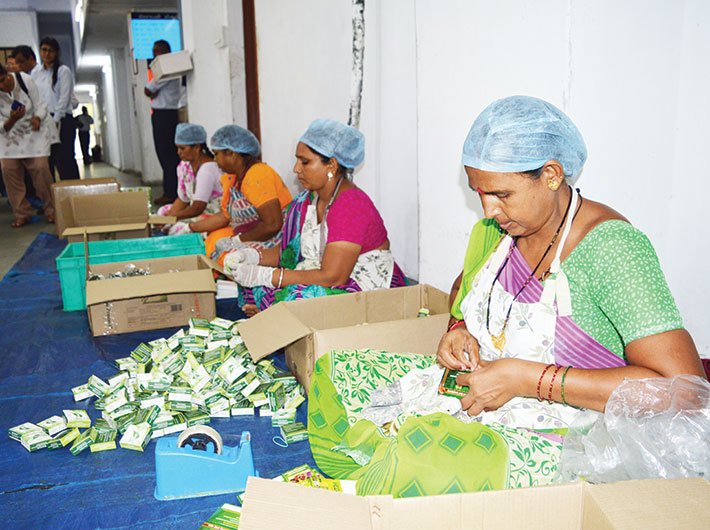When it comes to listing the benefits of neem leaves, properties like anti-bacterial and anti-fungal come immediately to the mind. But did you know that these humble leaves can help a child in getting admitted to a school, or help someone buy a refrigerator and transform a whole community? Well, the plant has been doing exactly this and much more in Gujarat’s Bharuch district.
Gujarat Narmada Valley Fertilizers and Chemicals Ltd (GNFC)’s Neem project, a central government-backed initiative, aims to exploit the curative properties of neem trees in Gujarat and generate rural employment thereby. Such is the success of this project that the central government has proposed to start similar project in six other states: Karnataka, Rajasthan, Uttar Pradesh, Madhya Pradesh, Andhra Pradesh and Maharashtra.
Neem trees are changing the lives of many in Bharuch, especially women. Take for example, Komal Ben, 46, from a village in the district. She earns Rs 1,500-2,500 a month by just collecting the fruits from neem trees around her house. Similarly, Sunita earns Rs 150-200 a day by packing neem soaps, while Shalu earns Rs 180 a day by pouring neem oil in bottles.
In May 2015, the ministry of chemicals and fertilisers made it mandatory for all indigenous producers of urea to neem-coat their produce. In the same year, during the independence day speech PM Modi said that neem-coated urea cannot be pilfered by middlemen and sold to chemical producers who need it. According to GNFC managing director Rajiv Gupta, the project started after the PM’s remarks.
The GNFC decided to use the residue of neem fruit in manufacturing other products, which has created a supplementary income of about Rs 15 crore for almost 1.50 lakh rural households.
In the process, it turned the ministry’s decision into an opportunity and made it a backward integration project by involving rural women. MM Upadhyay, chief manager, GNFC Neem, says, “Under the Neem project, the villagers, particularly women, collect neem fruits for GNFC and we further collect the same from them. Our neem fruit suppliers are some 4,000 villages in Gujarat and other areas, mostly women, who are being paid from Rs 6 to Rs 12 per kg. The fruits are then processed and made into neem cakes and neem oil.”
The oil extracted from neem seeds is used to coat urea, which gives farmers an added protection for their crops. Neem-coating also increases the nutrition value of crops. The other residue of the fruit is used to make neem-based products like soap, handwash and shampoo. At present, the GNFC is working on neem mosquito repellent.
All this is done at a small factory setup inside the GNFC township, which is divided into various parts, the biggest one being where neem seeds are filtered and others where soaps, shampoos, and fertilisers are prepared.
Shashi, 31, separates neem noodles, which will be converted into soaps, at one such factory. The project has been a boon to her. With the help of the income earned at the factory she is able to send her 11-year-old daughter to school again, who had to drop studies after class II due to financial constraints. Shashi has also purchased a refrigerator with her savings.
Explaining the process of making neem soaps, she says, “We place the neem mixture in this container and thoroughly mix pH solution in it. The paste is then left to dry. The dried paste is placed in a machine which prepares neem noodles, which is processed again to make neem cakes. The women then pack the cakes in boxes, which are then dispatched to the retailers and wholesalers.” She also shows the room where neem noodles are left to dry.
Most of the women working at the GNFC Neem unit have certificates of home-based manufacturers. “I can make neem soap and shampoo at home too. I have a certificate for it,” says Komal Ben with a huge smile.
The neem project has been lauded in a United Nations Development Programme (UNDP) impact assessment survey, which concluded that there has been a significant decrease in domestic violence cases and an increase in asset creation and education expenditure, as per a release by the GNFC. It has also been hailed as an example in community-led transformation. Started about two years ago, GNFC’s Neem project is set to make it big in the FMCG space in the coming years, the release adds.
“This project has benefitted rural women by generating income of about Rs 7,000 per month or more. This year the project will create supplementary income of about Rs 75 crore. The project was started as part of our CSR activity. However, its tremendous success has made it grow to the size that is comparable to our other business verticals. In the next three years or so it has a potential to become Rs 500 crore business,” says BS Joshi from GNFC.
Joshi claims that earlier the brokers and middlemen used to pay mere 1 or 2 rupees to the women for picking neem fruits. Then the GNFC authorities created a network of 2,200 collection centres across 4,000 villages of Gujarat through self-help groups (SHGs) and roped in women for making soaps, packaging and collection of seeds.
Gujarat has approximately 45 million neem trees, according to a 2013 Tree Census by the state forest department. Each neem tree yields between 10-25 kg of seeds in a season. Initially, around one lakh women used to work for the neem project. At present, the number is almost double, which is expected to be threefold in the couple of years. The GNFC authorities expect neem seed collection to touch 50,000 tonnes in coming years and neem oil production to scale up too. The company produces around 800-900 tonnes of neem oil, out of which 550 tonnes is used for urea coating, while the excess is used for value-added products.
The neem project has not only generated employment for the rural women, but has also fuelled entrepreneurial spirit in many. For example, Maltiben Choudhary from Pratappura village of Gandhinagar district.
According to GNFC authorities, when the neem project was explained to Maltiben and other women in her village they formed Sakhi Mandal. These women now not only collect seeds from their own villages but also from the nearby areas and sell it to the village level collection centre (VLCC).
“Maltiben and Sakhi Mandal members are the nodal persons for the project and the go-between for GNFC and the seed collectors. They take commission on per kilogram of neem seed that is sold to the VLCC. On an average the Sakhi Mandal members earn around Rs 8,000 a month during seed collection time,” claims Joshi.

